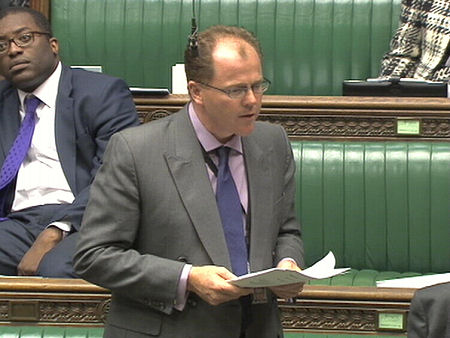30 January 2012
On Friday George held another of his Supermarket Surgeries at the Dereham Morrisons, getting great feedback from people saying ‘its nice to see our MP out and about when there ISN’T an election’.
Speaking about the event George said:
“An MP’s first duty is to their constituency. Its important for MPs to be out and about and accessible, and not just at election times. Several people commented yesterday that it was nice to see their MP out and about and available when there isn’t an election on.
Particular issues raised included the closure of Chambers and other local stores, the impact of Parking charges, and support for my comments on BBC Radio 5 live on the ‘cosy’ and unaccountable Bankers Bonus culture, and the need to reward risk and success not failure.
These informal ‘Supermarket Surgeries’ and ‘Farmers Market Surgeries’, and the ‘pint with your MP’ evenings in local pubs, are working really well. The informal settings mean I get to meet with lots of people who wouldn’t otherwise arrange an MP meeting and means I can get a much broader insight into constituents concerns.”
Speaking about the event George said:
“An MP’s first duty is to their constituency. Its important for MPs to be out and about and accessible, and not just at election times. Several people commented yesterday that it was nice to see their MP out and about and available when there isn’t an election on.
Particular issues raised included the closure of Chambers and other local stores, the impact of Parking charges, and support for my comments on BBC Radio 5 live on the ‘cosy’ and unaccountable Bankers Bonus culture, and the need to reward risk and success not failure.
These informal ‘Supermarket Surgeries’ and ‘Farmers Market Surgeries’, and the ‘pint with your MP’ evenings in local pubs, are working really well. The informal settings mean I get to meet with lots of people who wouldn’t otherwise arrange an MP meeting and means I can get a much broader insight into constituents concerns.”
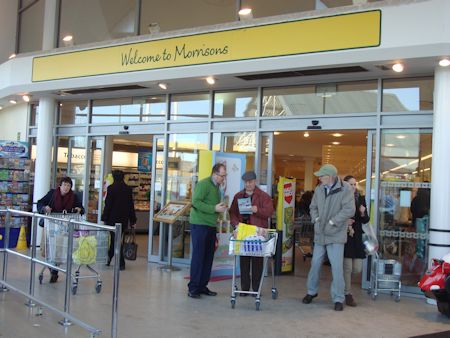
30 January 2012
On Friday George joined local MPs Richard Bacon, Norman Lamb and Elizabeth Truss for a meeting with The Country Land and Business Association (CLA) to discuss the challenges facing owners of land, property and businesses in rural Norfolk.
Alongside issues such as transport and broadband, they also discussed the current issue of Metal Theft and the CLA’s ‘Scrap the Cash Campaign’ to prohibit cash payments for the purchase of scrap metal in a bit to crackdown on this costly and rapidly growing crime.
Alongside issues such as transport and broadband, they also discussed the current issue of Metal Theft and the CLA’s ‘Scrap the Cash Campaign’ to prohibit cash payments for the purchase of scrap metal in a bit to crackdown on this costly and rapidly growing crime.
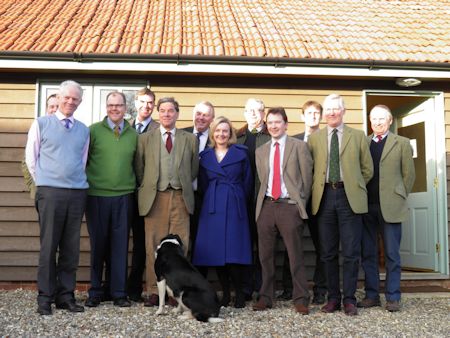
27 January 2012
Speaking on BBC Radio Norfolk this morning, George called for support for the UK’s food and agriculture sector and an end to unnecessary red tape holding back our export potential.
George, a former Parliamentary Officer for the NFU, said:
“Last week I visited Cranswick Country Foods, one of the biggest employers in Mid Norfolk, who are currently trying to export their pork products to China. This is a company who supply Jamie Oliver, Tesco’s Finest, and the top retailers in the UK, but they are being held back by red tape from opportunities in the Far East.
British farming and agriculture is a major exporter, but we export more to Belgium than to the fastest growing countries such as India, China, Brazil and Mexico. We need to change this. The truth is we set the highest standard in this country when it comes to health and safety and I am rightly proud of that, but petty regulations should not stand in the way of our growth. We need the Government to get behind and lend its weight to help our food producers.
What is clear is that our modern economy is a global economy and we need our food producers and the next generation of young entrepreneurs to start thinking about the competitive international market.”
BBC Radio Norfolk Interview available on BBCiPlayer: http://www.bbc.co.uk/programmes/p00mypdn
(Begins 1:19:40/2:30:00)
George, a former Parliamentary Officer for the NFU, said:
“Last week I visited Cranswick Country Foods, one of the biggest employers in Mid Norfolk, who are currently trying to export their pork products to China. This is a company who supply Jamie Oliver, Tesco’s Finest, and the top retailers in the UK, but they are being held back by red tape from opportunities in the Far East.
British farming and agriculture is a major exporter, but we export more to Belgium than to the fastest growing countries such as India, China, Brazil and Mexico. We need to change this. The truth is we set the highest standard in this country when it comes to health and safety and I am rightly proud of that, but petty regulations should not stand in the way of our growth. We need the Government to get behind and lend its weight to help our food producers.
What is clear is that our modern economy is a global economy and we need our food producers and the next generation of young entrepreneurs to start thinking about the competitive international market.”
BBC Radio Norfolk Interview available on BBCiPlayer: http://www.bbc.co.uk/programmes/p00mypdn
(Begins 1:19:40/2:30:00)

24 January 2012
George Freeman backs tax reforms which have removed 1.1 million people from paying tax altogether and also reducing the tax bill of 20 million of the poorest families.
George Freeman (Mid Norfolk) (Con): Will the Minister also confirm that, as well as the 1.1 million people taken out of tax, we are reducing the tax bill of 20 million of the poorest families?
Mr Gauke: Absolutely. It is important to point out that it is not just those who are taken out of income tax altogether who benefit, but the approximately 25 million people overall who receive an increase in personal allowance. That should be supported by hon. Members of all parties.
| Hansard
George Freeman (Mid Norfolk) (Con): Will the Minister also confirm that, as well as the 1.1 million people taken out of tax, we are reducing the tax bill of 20 million of the poorest families?
Mr Gauke: Absolutely. It is important to point out that it is not just those who are taken out of income tax altogether who benefit, but the approximately 25 million people overall who receive an increase in personal allowance. That should be supported by hon. Members of all parties.
| Hansard
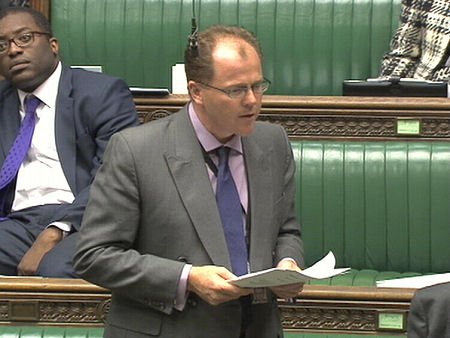
24 January 2012
Speaking in Parliament this morning in a debate on the merits of promoting self employment to school leavers, George highlighted the particular importance of self employment to the rural economy, the importance of helping school leavers experience self employment through mentoring schemes like The Norfolk Way work experience Bursary, and the need to encourage non-academic school leavers to realise the opportunities self employment offers.
The morning’s debate followed the recent launch of the Virgin Media Pioneers report Control Shift: The rise of the young entrepreneur which sets out a number of recommendations to Government and to the business community about the practical support budding entrepreneurs need to grow their business. Sir Richard Branson joined the debate to hear the contribution of ideas from MPs.
Speaking after the debate George Freeman said:
“A vibrant Norfolk needs a vibrant rural economy with lots of small businesses and self employment. We must prepare our youngsters not to expect a job for life, but to instead be enterprising and prepared to be self employed at some stage in their career. Already the UK rural economy in places like Norfolk has traditionally had high levels of self employment, but the new jobs of tomorrow, whether in the fast growing sectors of media and technology or in locally sourced speciality foods and crafts, also rely heavily on self employment.
“Sir Richard Branson didn’t go to University; he started the Virgin Empire with £300. It now employs 60,000 people and is worth billions. I fully support the Virgin Media proposals and am delighted that Sir Richard Branson has agreed to meet with me to discuss The Norfolk Way Bursary and how we can help to promote Norfolk's rural entrepreneurs who together will build the businesses of tomorrow.”
FULL TEXT:
George Freeman: I congratulate my hon. Friend and my hon. Friend the Member for Wyre Forest (Mark Garnier) on raising this important debate. I also congratulate Virgin on the support and work that it is doing in this field. Like many hon. Members here, I am sure that he agrees—he has touched on this—that part of what we must do is to help those youngsters who do not have the experience of entrepreneurship and self-employment through their family, so that they can experience it through schools. Many of us in our constituencies can help and, indeed, are helping with schemes. In my constituency, we have set up a programme called the Norfolk Way enterprise bursary and we are linking school leavers with local businesses, which can be very empowering. Lastly, does my hon. Friend agree that it is very striking that some of our best entrepreneurs, for example, Richard Branson and Bill Gates, are not graduates? They started their businesses pre-university, which sends a very powerful message to youngsters who are feeling disillusioned and disengaged by the mainstream curriculum. Some of our most deprived communities could benefit hugely from such initiatives.
Richard Harrington: My hon. Friend makes very valid points. I hope that I speak for all hon. Members involved in this debate when I point out that Richard Branson and Bill Gates are examples of people whom we would regard as being very successful and would look up to. Both Richard Branson and Bill Gates were rejects from the mainstream academic system. Obviously, when I say “rejects,” I do not mean that they were not up to it, but that they were, through whatever personality they had or whatever came about, not part of it. My hon. Friend’s helpful intervention supports my argument, rather than the other way round.
Links:
| The Norfolk Way
| Virgin Media Pioneers
| Control Shift: The rise of the young entrepreneur
| Hansard
The morning’s debate followed the recent launch of the Virgin Media Pioneers report Control Shift: The rise of the young entrepreneur which sets out a number of recommendations to Government and to the business community about the practical support budding entrepreneurs need to grow their business. Sir Richard Branson joined the debate to hear the contribution of ideas from MPs.
Speaking after the debate George Freeman said:
“A vibrant Norfolk needs a vibrant rural economy with lots of small businesses and self employment. We must prepare our youngsters not to expect a job for life, but to instead be enterprising and prepared to be self employed at some stage in their career. Already the UK rural economy in places like Norfolk has traditionally had high levels of self employment, but the new jobs of tomorrow, whether in the fast growing sectors of media and technology or in locally sourced speciality foods and crafts, also rely heavily on self employment.
“Sir Richard Branson didn’t go to University; he started the Virgin Empire with £300. It now employs 60,000 people and is worth billions. I fully support the Virgin Media proposals and am delighted that Sir Richard Branson has agreed to meet with me to discuss The Norfolk Way Bursary and how we can help to promote Norfolk's rural entrepreneurs who together will build the businesses of tomorrow.”
FULL TEXT:
George Freeman: I congratulate my hon. Friend and my hon. Friend the Member for Wyre Forest (Mark Garnier) on raising this important debate. I also congratulate Virgin on the support and work that it is doing in this field. Like many hon. Members here, I am sure that he agrees—he has touched on this—that part of what we must do is to help those youngsters who do not have the experience of entrepreneurship and self-employment through their family, so that they can experience it through schools. Many of us in our constituencies can help and, indeed, are helping with schemes. In my constituency, we have set up a programme called the Norfolk Way enterprise bursary and we are linking school leavers with local businesses, which can be very empowering. Lastly, does my hon. Friend agree that it is very striking that some of our best entrepreneurs, for example, Richard Branson and Bill Gates, are not graduates? They started their businesses pre-university, which sends a very powerful message to youngsters who are feeling disillusioned and disengaged by the mainstream curriculum. Some of our most deprived communities could benefit hugely from such initiatives.
Richard Harrington: My hon. Friend makes very valid points. I hope that I speak for all hon. Members involved in this debate when I point out that Richard Branson and Bill Gates are examples of people whom we would regard as being very successful and would look up to. Both Richard Branson and Bill Gates were rejects from the mainstream academic system. Obviously, when I say “rejects,” I do not mean that they were not up to it, but that they were, through whatever personality they had or whatever came about, not part of it. My hon. Friend’s helpful intervention supports my argument, rather than the other way round.
Links:
| The Norfolk Way
| Virgin Media Pioneers
| Control Shift: The rise of the young entrepreneur
| Hansard
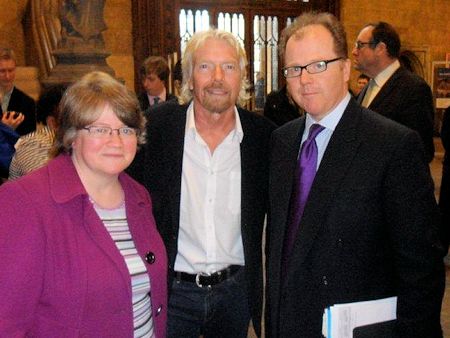
23 January 2012
On Friday George chaired a major public meeting on the future of Wymondham town, launching one of the most important consultations with residents for years.
The public meeting was from 6.30pm at Ketts Park Community Centre, Harts Farm Road, and there was a consultation exhibition at 4.30pm on the same day and at the same venue.
Both exhibition and public meeting mark the opening of the consultation on the Wymondham part of the South Norfolk development plan, by organisers South Norfolk Council.
Speaking before the event, George urged residents to try and come to both events, and get involved in the consultation.
He said:
“I'm delighted to have been asked to Chair this important meeting. There are some important questions about the long term needs of Wymondham and what the appropriate approach to development should be and this meeting is about making sure that the views of local people are heard.
“As the local MP I have no proposals or responsibility for planning, which is rightly the job of local councillors, but I am keen to do all I can to support public involvement.
“Too often planning can seem to be something done to communities rather than by them, and I hope as many people as possible will come along to the exhibition and have their say.”
During the meeting George stressed that plans for 2,200 new homes in Wymondham over the next 14 years should be a maximum and not a minimum figure and said that the majority of the audience were in favour of growth of between 1,000 and 2,000 new homes in Wymondham, but called for infrastructure improvements to come first.
Speaking after the event George said:
“I was delighted to be asked to chair the meeting, which was attended by more than 300 people, and to make sure that the views of all parts of the community were properly aired.”
EDP: MP George Freeman hosts meeting on Wymondham’s growth
The public meeting was from 6.30pm at Ketts Park Community Centre, Harts Farm Road, and there was a consultation exhibition at 4.30pm on the same day and at the same venue.
Both exhibition and public meeting mark the opening of the consultation on the Wymondham part of the South Norfolk development plan, by organisers South Norfolk Council.
Speaking before the event, George urged residents to try and come to both events, and get involved in the consultation.
He said:
“I'm delighted to have been asked to Chair this important meeting. There are some important questions about the long term needs of Wymondham and what the appropriate approach to development should be and this meeting is about making sure that the views of local people are heard.
“As the local MP I have no proposals or responsibility for planning, which is rightly the job of local councillors, but I am keen to do all I can to support public involvement.
“Too often planning can seem to be something done to communities rather than by them, and I hope as many people as possible will come along to the exhibition and have their say.”
During the meeting George stressed that plans for 2,200 new homes in Wymondham over the next 14 years should be a maximum and not a minimum figure and said that the majority of the audience were in favour of growth of between 1,000 and 2,000 new homes in Wymondham, but called for infrastructure improvements to come first.
Speaking after the event George said:
“I was delighted to be asked to chair the meeting, which was attended by more than 300 people, and to make sure that the views of all parts of the community were properly aired.”
EDP: MP George Freeman hosts meeting on Wymondham’s growth
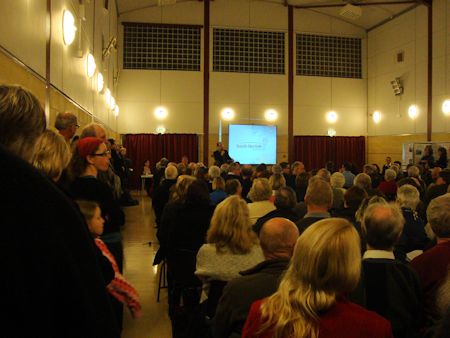
23 January 2012
On Friday George visited Barley Chalu Ltd to discuss their expansion and a number of issues facing Wymondham, the A11 corridor, Norfolk and the East Anglian economy and UK plc.
With a turnover of £6.5m and 100 employees, the company exports around the world, serving some of the world’s biggest aluminium retailers and systems suppliers and putting aluminium into iconic construction projects such as airports and the London Olympic village.
They are passionate about Norfolk and keen to stay and grow in the area, looking to expand their current site in heart of Wymondham in the next five years.
It was a great example of the business opportunities we have in the Wymondham / Attleborough / A11 corridor.
| EDP: MP George Freeman visits Wymondham firm Barley Chalu
Photos: George Freeman MP with managing director Mo Panam on his visit to Barley Chalu Ltd in Wymondham

With a turnover of £6.5m and 100 employees, the company exports around the world, serving some of the world’s biggest aluminium retailers and systems suppliers and putting aluminium into iconic construction projects such as airports and the London Olympic village.
They are passionate about Norfolk and keen to stay and grow in the area, looking to expand their current site in heart of Wymondham in the next five years.
It was a great example of the business opportunities we have in the Wymondham / Attleborough / A11 corridor.
| EDP: MP George Freeman visits Wymondham firm Barley Chalu
Photos: George Freeman MP with managing director Mo Panam on his visit to Barley Chalu Ltd in Wymondham

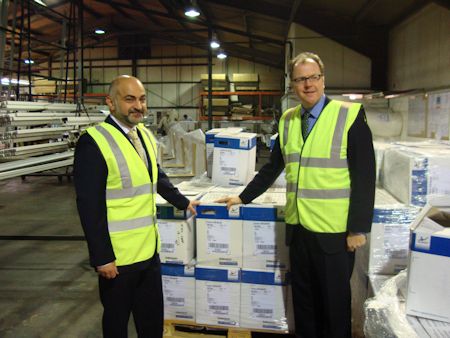
19 January 2012
George Freeman raises concerns about a recent Food Standards Agency decision to turn down an export licence application.
George Freeman (Mid Norfolk) (Con): Does the Minister share my concern at the recent decision by the Food Standards Agency to turn down a licence application by Cranswick Country Foods to export to China? The matter was also raised last week at Prime Minister’s questions by my hon. Friend the Member for Beverley and Holderness (Mr Stuart). Will the Minister give us some advice on how to bring pressure to bear on the FSA?
Mr Paice: I have already agreed to meet my hon. Friend the Member for Beverley and Holderness (Mr Stuart), and if my hon. Friend the Member for Mid Norfolk (George Freeman) wishes to attend that meeting, he will be extremely welcome. I cannot go into details now, but I must make the point that the role of the FSA is to ascertain whether the abattoirs meet the standards laid down by the Chinese; it is effectively acting as an agent for the Chinese Government in this instance.
| Hansard
George Freeman (Mid Norfolk) (Con): Does the Minister share my concern at the recent decision by the Food Standards Agency to turn down a licence application by Cranswick Country Foods to export to China? The matter was also raised last week at Prime Minister’s questions by my hon. Friend the Member for Beverley and Holderness (Mr Stuart). Will the Minister give us some advice on how to bring pressure to bear on the FSA?
Mr Paice: I have already agreed to meet my hon. Friend the Member for Beverley and Holderness (Mr Stuart), and if my hon. Friend the Member for Mid Norfolk (George Freeman) wishes to attend that meeting, he will be extremely welcome. I cannot go into details now, but I must make the point that the role of the FSA is to ascertain whether the abattoirs meet the standards laid down by the Chinese; it is effectively acting as an agent for the Chinese Government in this instance.
| Hansard
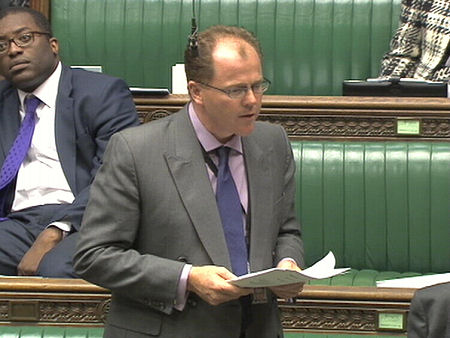
19 January 2012
George Freeman calls for a central portal for global industry to interact with British agriculture, science and technology centres of excellence which are currently fragmented throughout the UK.
George Freeman (Mid Norfolk) (Con): What plans she has to promote innovation in the farming industry. [R] [90494]
The Secretary of State for Environment, Food and Rural Affairs (Mrs Caroline Spelman): Innovation is essential to enhancing the competitiveness and resilience of UK agriculture, and we welcome the emphasis in the new common agricultural policy reform proposals on stimulating innovation. In March, in partnership with the Technology Strategy Board we are holding an innovation for growth summit with the agri-food sector. The summit will raise awareness of the potential for growth, and it includes a competition with £500,000 in prizes for small and medium-sized enterprises to develop their innovative ideas. As we speak, the invitations are going out.
George Freeman: I thank the Secretary of State for that answer. Does she agree that, as we as a nation look for ways to develop a sustainable recovery and to support sustainable development throughout the world, British agriculture, science and technology have a key role to play as exports, not least through centres such as the Norwich research park in my own county of Norfolk? Does she also agree that we need somehow to create a web that links up our centres of excellence, currently fragmented throughout the UK, to create a portal for global industry to interact with our science?
Mrs Spelman: I completely agree, and I esteem highly the research capacity in my hon. Friend’s constituency. The Government’s investment of £400 million per annum is co-ordinated throughout the Government, under the UK cross-Government food research and innovation strategy, which is published by the Government Office for Science. The cross-Government and research councils’ programme on global food security will also be a key vehicle for driving that agenda forward.
| Hansard
George Freeman (Mid Norfolk) (Con): What plans she has to promote innovation in the farming industry. [R] [90494]
The Secretary of State for Environment, Food and Rural Affairs (Mrs Caroline Spelman): Innovation is essential to enhancing the competitiveness and resilience of UK agriculture, and we welcome the emphasis in the new common agricultural policy reform proposals on stimulating innovation. In March, in partnership with the Technology Strategy Board we are holding an innovation for growth summit with the agri-food sector. The summit will raise awareness of the potential for growth, and it includes a competition with £500,000 in prizes for small and medium-sized enterprises to develop their innovative ideas. As we speak, the invitations are going out.
George Freeman: I thank the Secretary of State for that answer. Does she agree that, as we as a nation look for ways to develop a sustainable recovery and to support sustainable development throughout the world, British agriculture, science and technology have a key role to play as exports, not least through centres such as the Norwich research park in my own county of Norfolk? Does she also agree that we need somehow to create a web that links up our centres of excellence, currently fragmented throughout the UK, to create a portal for global industry to interact with our science?
Mrs Spelman: I completely agree, and I esteem highly the research capacity in my hon. Friend’s constituency. The Government’s investment of £400 million per annum is co-ordinated throughout the Government, under the UK cross-Government food research and innovation strategy, which is published by the Government Office for Science. The cross-Government and research councils’ programme on global food security will also be a key vehicle for driving that agenda forward.
| Hansard
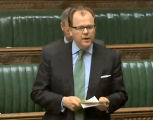
17 January 2012
Across the UK whilst some high streets continue to thrive, a third are degenerating or failing, and by 2014 less than 40% of retail spending will be on the high street. With town centre vacancy rates doubling in the space of two years this is something we are all starting to see across the country and it is hitting the rural economy too. In the Mid Norfolk towns of Wymondham, Attleborough, Dereham, and Watton we can see market towns facing the same problems: traffic congestions and inconvenient parking, the closure of popular high street shops and dominance of charity shops, loss of customers to superstores, and most importantly a loss of confidence.
Responding to the urgency of the challenges facing market towns, today George Freeman, MP for Mid Norfolk, joined a Parliamentary debate in the House on the future of the high street.
Speaking in the debate George Freeman said:
“There is no getting around the fact that in our busy, modern working lives, time pressures increasingly mean that the ‘one stop’ shopping experience of the weekly supermarket visit is here to stay. We need to adopt a policy which combines this reality and invites visitors to our high streets, and towns like Wymondham, for different reasons. We need to capitalise on our heritage and bring in local trade to cafes and craft shops, but to achieve this vision for our towns we urgently need to rectify the issue of traffic and parking and offer a safe and, perhaps in places, pedestrianised town experience.”
Commenting after the debate George Freeman added:
“Whilst there are challenges facing our high streets, there ought also to be a lot of positives. We continue to see large shifts of people choosing to live in rural Norfolk and more people also deciding to work from home. They all need meeting places, particularly those working from home, and towns need to be looking at how to attract these new customers as part of their plans. As ever it’s a case of making the experience of visiting our towns easier, with better transport links, parking, and more choice. Learning lessons from around the country can help to show us what can be done.
Town centres are key to the rural economy and our community and important to us all. On Friday the strength of public feeling will be shown at a public consultation I am chairing for South Norfolk Council. That 300 people are expected to attend to discuss their priorities for Wymondham shows how much we care.”
FULL TEXT OF GEORGE'S SPEECH
George Freeman (Mid Norfolk) (Con): I add my name to the list of those congratulating my hon. Friend the Member for Nuneaton (Mr Jones) on securing this important debate and I congratulate the Backbench Business Committee on arranging it. At this stage of the debate, there is little left to add to the excellent contributions of so many hon. Members, particularly of my hon. Friends. I want to highlight one or two of the concerns I share with others for my Mid Norfolk constituency, but as we move to the close I want to focus on some of the positives, as I believe there are a number of reasons for being positive about the future of our market towns, particularly our rural market towns.
Mid Norfolk is not an affluent constituency. We are not part of the celebrated Norfolk triangle, and we are not part of the “gold coast”; Burnham market is a long way from my constituency. Our average income is about £17,500 a year; we have four market towns and 114 villages. Many of the problems described today are all too evident as one travels in Dereham, my capital, the ancient heart of Norfolk. We have recently seen the closure of Chambers, the celebrated and historic store. I was recently delighted to receive a petition from the town’s residents to the Co-op, asking it to change its decision to close.
In Wymondham, home of the great abbey and the place of Robert Kett’s rebellion, I have the pleasure this Friday of chairing a meeting at which 400 residents are due to come to talk about the town’s plan, as it faces an application from Asda for a development in the middle of the town. There is a huge appetite to discuss issues around sustainable development, facilities for the young and the old, and ensuring that we have a genuine long-term plan that looks at the needs of Wymondham over the next 20 years—not just for Wymondham either, but for the surrounding villages that rely on it, too.
In Attleborough, zoned for development under Labour’s regional spatial strategy and to be doubled in size with 4,000 houses, the challenge is to come up with the right
17 Jan 2012 : Column 704
level of growth that can provide the infrastructure levy that will fund the bypass we need, while keeping Attleborough as the beautiful market town in which people want to live and work. In Watton, the heart of the Wayland valley, there are huge pressures on the high street, with closures of traditional stores and huge local concern that the town centre is losing its viability.
Why, then, am I optimistic? After several decades in which our town centres, in the words of my hon. Friend the Member for Penrith and The Border (Rory Stewart), have been “woefully badly catered for”, I believe that we have serious grounds to be optimistic. First, because people care—and such care has been demonstrated today in the level, strength and depth of opinion voiced in this debate, while our residents also care, as evidenced by the 300 or 400 people due to turn up on Wymondham on Friday evening.
Secondly, I am confident because around the country there are inspiring examples of enlightened local council leaders, town councils, residents associations and, indeed, of best practice, which have shown that it is possible to combine the one-stop shop convenience of an out-of-town supermarket that people with busy lives need with the heritage, community and authentic local community experience of a well run and well organised town centre. These things are not beyond the wit of man.
I am confident, thirdly, because of the Government’s measures, including the Localism Bill, community planning measures, the big society, the emphasis on the rebalanced economy, the localisation of business rates and the support for small business generally.
Fourthly, I am confident because the public themselves are showing in their retail habits a growing demand for the local, the artisanal, the authentic and for an increased interest and involvement in the retail experience seen as an authentic part of the community of which they are part. I am confident, fifthly, because of the measures on broadband.
In my Mid Norfolk constituency we might have been neglected by successive Governments for 30 or 40 years, but if we put all these measures together, along with the investment in the Cambridge-Norwich railway line, in the A11, in rural broadband and in science at the Norwich research park, I would submit that our area is on the cusp of a renaissance—a renaissance that we describe and seek to promote locally through a project called the Norfolk way, a renaissance of small businesses coming back to the countryside in converted barns and converted turkey sheds, empowered with globally competitive information technology and trading between the hubs of Cambridge and Norwich.
If we can have a vibrant rural economy, we will have a chance to have vibrant market towns. For no one are those market towns more important than for the people trading in the rural economy. I close with the suggestion that we can be optimistic provided that we take the energy of today and channel it into the enlightened policies of tomorrow.
| Hansard
Responding to the urgency of the challenges facing market towns, today George Freeman, MP for Mid Norfolk, joined a Parliamentary debate in the House on the future of the high street.
Speaking in the debate George Freeman said:
“There is no getting around the fact that in our busy, modern working lives, time pressures increasingly mean that the ‘one stop’ shopping experience of the weekly supermarket visit is here to stay. We need to adopt a policy which combines this reality and invites visitors to our high streets, and towns like Wymondham, for different reasons. We need to capitalise on our heritage and bring in local trade to cafes and craft shops, but to achieve this vision for our towns we urgently need to rectify the issue of traffic and parking and offer a safe and, perhaps in places, pedestrianised town experience.”
Commenting after the debate George Freeman added:
“Whilst there are challenges facing our high streets, there ought also to be a lot of positives. We continue to see large shifts of people choosing to live in rural Norfolk and more people also deciding to work from home. They all need meeting places, particularly those working from home, and towns need to be looking at how to attract these new customers as part of their plans. As ever it’s a case of making the experience of visiting our towns easier, with better transport links, parking, and more choice. Learning lessons from around the country can help to show us what can be done.
Town centres are key to the rural economy and our community and important to us all. On Friday the strength of public feeling will be shown at a public consultation I am chairing for South Norfolk Council. That 300 people are expected to attend to discuss their priorities for Wymondham shows how much we care.”
FULL TEXT OF GEORGE'S SPEECH
George Freeman (Mid Norfolk) (Con): I add my name to the list of those congratulating my hon. Friend the Member for Nuneaton (Mr Jones) on securing this important debate and I congratulate the Backbench Business Committee on arranging it. At this stage of the debate, there is little left to add to the excellent contributions of so many hon. Members, particularly of my hon. Friends. I want to highlight one or two of the concerns I share with others for my Mid Norfolk constituency, but as we move to the close I want to focus on some of the positives, as I believe there are a number of reasons for being positive about the future of our market towns, particularly our rural market towns.
Mid Norfolk is not an affluent constituency. We are not part of the celebrated Norfolk triangle, and we are not part of the “gold coast”; Burnham market is a long way from my constituency. Our average income is about £17,500 a year; we have four market towns and 114 villages. Many of the problems described today are all too evident as one travels in Dereham, my capital, the ancient heart of Norfolk. We have recently seen the closure of Chambers, the celebrated and historic store. I was recently delighted to receive a petition from the town’s residents to the Co-op, asking it to change its decision to close.
In Wymondham, home of the great abbey and the place of Robert Kett’s rebellion, I have the pleasure this Friday of chairing a meeting at which 400 residents are due to come to talk about the town’s plan, as it faces an application from Asda for a development in the middle of the town. There is a huge appetite to discuss issues around sustainable development, facilities for the young and the old, and ensuring that we have a genuine long-term plan that looks at the needs of Wymondham over the next 20 years—not just for Wymondham either, but for the surrounding villages that rely on it, too.
In Attleborough, zoned for development under Labour’s regional spatial strategy and to be doubled in size with 4,000 houses, the challenge is to come up with the right
17 Jan 2012 : Column 704
level of growth that can provide the infrastructure levy that will fund the bypass we need, while keeping Attleborough as the beautiful market town in which people want to live and work. In Watton, the heart of the Wayland valley, there are huge pressures on the high street, with closures of traditional stores and huge local concern that the town centre is losing its viability.
Why, then, am I optimistic? After several decades in which our town centres, in the words of my hon. Friend the Member for Penrith and The Border (Rory Stewart), have been “woefully badly catered for”, I believe that we have serious grounds to be optimistic. First, because people care—and such care has been demonstrated today in the level, strength and depth of opinion voiced in this debate, while our residents also care, as evidenced by the 300 or 400 people due to turn up on Wymondham on Friday evening.
Secondly, I am confident because around the country there are inspiring examples of enlightened local council leaders, town councils, residents associations and, indeed, of best practice, which have shown that it is possible to combine the one-stop shop convenience of an out-of-town supermarket that people with busy lives need with the heritage, community and authentic local community experience of a well run and well organised town centre. These things are not beyond the wit of man.
I am confident, thirdly, because of the Government’s measures, including the Localism Bill, community planning measures, the big society, the emphasis on the rebalanced economy, the localisation of business rates and the support for small business generally.
Fourthly, I am confident because the public themselves are showing in their retail habits a growing demand for the local, the artisanal, the authentic and for an increased interest and involvement in the retail experience seen as an authentic part of the community of which they are part. I am confident, fifthly, because of the measures on broadband.
In my Mid Norfolk constituency we might have been neglected by successive Governments for 30 or 40 years, but if we put all these measures together, along with the investment in the Cambridge-Norwich railway line, in the A11, in rural broadband and in science at the Norwich research park, I would submit that our area is on the cusp of a renaissance—a renaissance that we describe and seek to promote locally through a project called the Norfolk way, a renaissance of small businesses coming back to the countryside in converted barns and converted turkey sheds, empowered with globally competitive information technology and trading between the hubs of Cambridge and Norwich.
If we can have a vibrant rural economy, we will have a chance to have vibrant market towns. For no one are those market towns more important than for the people trading in the rural economy. I close with the suggestion that we can be optimistic provided that we take the energy of today and channel it into the enlightened policies of tomorrow.
| Hansard
